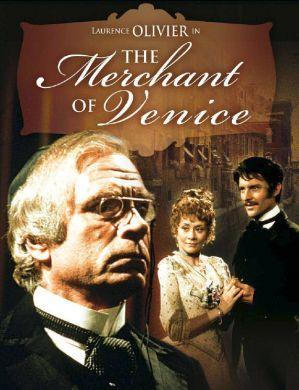The Merchant of Venice (1973) -- Film review
The 1973 National Theater film production of The Merchant of Venice packs several surprises, particularly in terms of the heated controversy over Shylock's character. Although sympathetic interpretations of the villain aren't uncommon, director John Sichel manages to keep the play fresh with a few clever cinematic manipulations of Shakespeare's text. The movie occasionally becomes overly sentimental to create pathos for Shylock; however, Sichel's portrayal of Antonio's character, Bassanio's character, and Shylock's relationship with Jessica results in an unusual and generally convincing take on the Shakespearean play.
To invoke sympathy for Shylock, Sichel makes Antonio and Shylock into ostensible doppelgangers. In the courtroom scene, Portia cannot tell them apart, implying that the two are similar not only in appearance but in essence too. The two are of similar height, both well into middle age, and in some scenes identically garbed in black suits and a top hat. As the play's original text is retained, it is close to impossible to completely reverse the character functions of Antonio and Shylock and make the former detestable and the latter a saint; therefore Sichel directs the sympathies of the audience toward the pair of them, making them twin victims. We still feel sorry for Antonio as we fear for his life, but now we are sympathetic toward Shylock as well.
No play is complete without villains, of course, and, having eradicated the traditional antagonist, Sichel has Bassanio and Jessica step into that role. Bassanio is portrayed as a greedy young man who takes advantage of Antonio's generosity with his youth and enthusiasm. Bassanio exhibits impatience Antonio informs him that he has no money because his riches are at sea, but brightens as soon as Antonio suggests that Bassanio try his credit in Venice. Jessica is portrayed as a heartless young woman who elopes with the Christian Lorenzo, making away with her father's cash. This act veritably breaks Shylock's heart. Whereas many have read Shylock's cry "My daughter! O my ducats! O my daughter!" as expressive mainly of his greed, Shylock's emphasis in this production is clearly on his daughter's betrayal. Salarino's taunts are particularly venomous when juxtaposed thus with Shylock's extreme vulnerability, and make the latter appear all the more human. In fact, Sichel draws a direct link between Jessica's escape and Shylock's exacting the bond: Salarino's jeers seem to provoke Shylock into a desire for revenge for his daughter, which he projects unto the blood bond. Antonio becomes for Shylock a symbol of that detested Christianity which took his daughter away from him. When Shylock is forbidden his revenge at the trial, we are made to feel for him as a man who has now lost his last hope for happiness; after the loss of his daughter, he is left bereft and humiliated, and our sympathy is for a grieving father.
Although Sichel manipulates dialogue very cleverly in his interpretation of the play, his use of visual tricks crosses the line into melodrama. For instance, Shylock is heard weeping pathetically offstage after the final verdict in the trial scene. The camera angles utilized after the verdict is sounded are also exaggerated: Shylock is filmed, hunched and tragic, from above, while the Christians are shown from below, exaggerating their stature and emphasizing the extent of their cold-heartedness. Overall, however, Sichel provides an interesting interpretation of the text. Worth a watch.









Comments
Post a Comment
Hey friend! 🌈 I can't help with your assignments but maybe other readers can. Good luck! 🤞